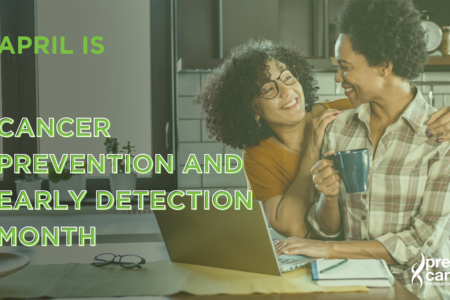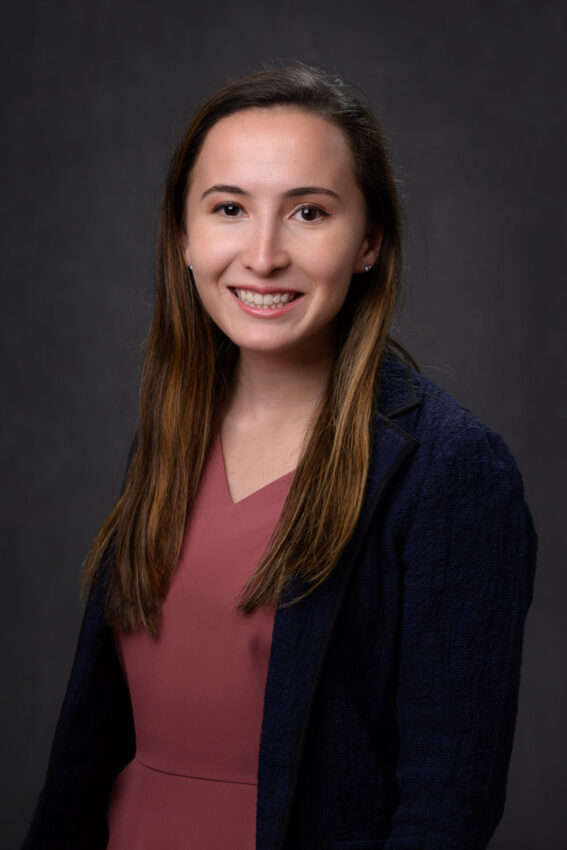
Share On Social!
In early 2019, Gabriella “Gaby” Godines got the news that she wasn’t accepted to medical school.
She was understandably disappointed, but she’s a firm believer that everything happens for a reason.
Looking back, Gaby can confirm that medical school wasn’t the right path for her at that time.
Instead, her opportunity to pursue a career in medicine would come later – after a few more years of patience, hard work, and compassion, and an internship at the Institute for Health Promotion Research (IHPR) at UT Health San Antonio.
“Everyone has different journeys toward their goal,” Gaby said. “I’m really grateful for where I am.”
Journey to Medicine
Growing up in Laredo, Texas, a border town, Gaby spent a lot of time in her father’s medical clinic where he still works as a gastrointestinal (GI) doctor.
Her father primarily serves the Laredo population, which is about 96% Latino. Approximately 22% of the total population lives in poverty, and about 31% of people under age 65 don’t have health insurance.
Shadowing her father in his clinic exposed Gaby to the realities of health inequities, including lack of access to health insurance. She learned how these health inequities contribute to health disparities in the Latino population, such as higher rates of cancer and other chronic diseases.
These experiences led her to pursue a Bachelor of Science in human biology with a concentration in neurobiology and psychology at Stanford University in California.
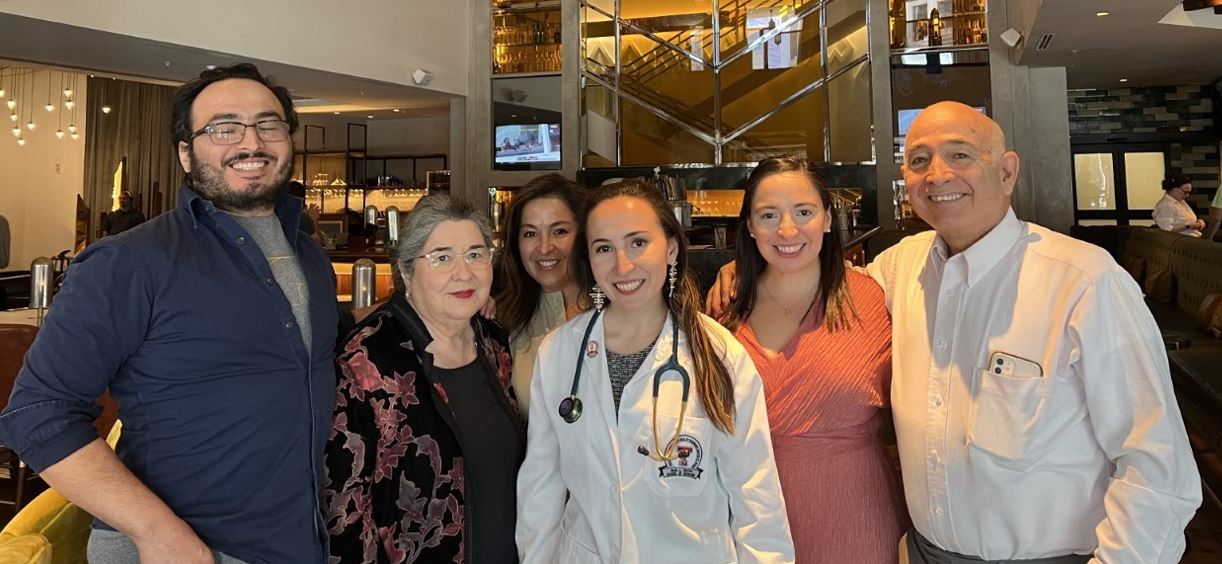 Gaby with her family at her school’s white coat ceremony
Gaby with her family at her school’s white coat ceremony
When she graduated in 2017, she took some time to “find herself” and began working as a tutor in California.
She later moved back to Texas and began working as a medical scribe at UT Health San Antonio.
“I really enjoyed that job because I got to work directly with a lot of doctors and different specialties, like cardiology, dermatology, and gynecology,” Gaby said.
Working as a medical scribe solidified Gaby’s passion for medicine. She applied to medical school for the first time during the 2018-2019 application cycle.
But then, several tragedies struck her family, and she didn’t get accepted to medical school.
“I was grateful to have some interviews with schools and get some feedback on my qualifications, but I wasn’t really in the best state of mind to attend school at the time,” Gaby explained. “I was really thankful it didn’t work out, because I just wanted to stay home and be present with family.”
Despite hardships, Gaby was persistent in pursuing her dream of becoming a physician.
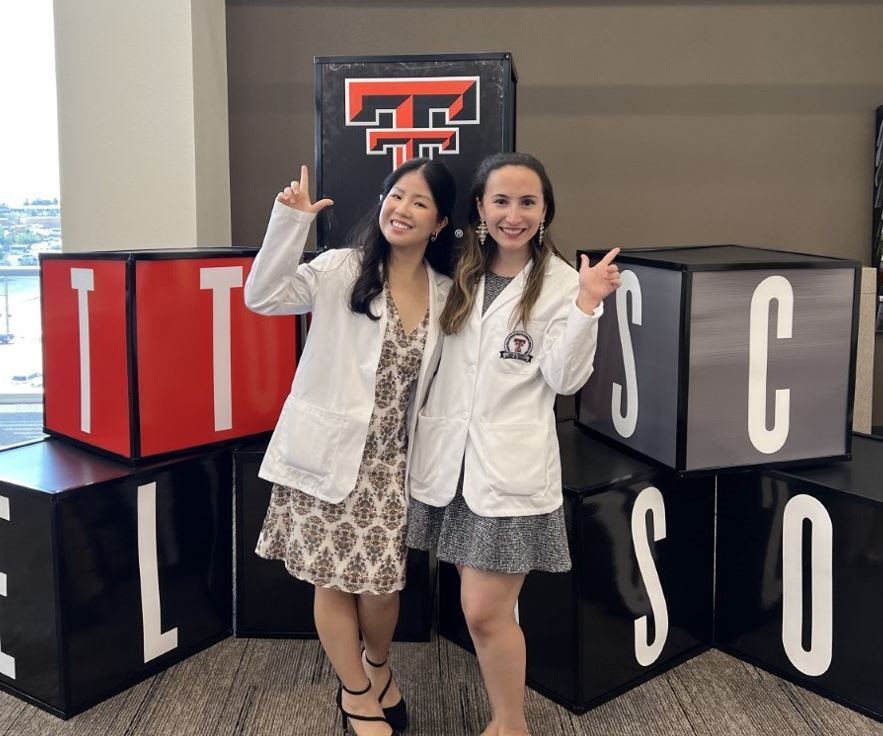
To strengthen her chances of being accepted to medical school, she earned a master’s degree in medical science from the University of North Texas Health Science Center at Fort Worth in the summer of 2021.
“That’s also around the time when the COVID-19 pandemic happened, so I was also spending a lot of time doing volunteer work in my hometown,” Gaby said.
In the summer of 2021, Gaby also got the chance to join the IHPR at UT Health San Antonio as a research assistant under the mentorship of Dr. Amelie G. Ramirez.
This internship would further guide her on the path to medicine.
“I came to the IHPR because I’ve always been interested in addressing health disparities in the Latino community because of where I grew up,” Gaby said. “The IHPR is really unique because it’s entirely focused on Latino health, and I haven’t really seen anything like it before.”
Through her internship, Gaby played a key role in commencing the IHPR’s National Institute of Health-funded Avanzando Caminos study, which is enrolling 1,500 Latino cancer survivors in South Texas and 1,500 more in Miami to help unpack the social, cultural, behavioral, mental, biological, and medical influences on post-cancer life.
“Being a research assistant for this study opened my eyes to the clinical research side of medicine,” Gaby said. “It also helped me realize how important it is to have compassion and help others feel listened to and cared for, especially when it comes to their cancer journey.”
After years of serving her community and building up her confidence, Gaby decided to apply to medical school again during the 2021-2022 application cycle.
“That time around, I got multiple acceptances and it felt like it was the right time. I ultimately accepted an offer at Paul L. Foster School of Medicine at Texas Tech University Health Sciences Center in El Paso,” Gaby said.
Providing Culturally Competent Healthcare
When asked how her first year of medical school went, Gaby laughed and replied, “How much time do you have?”
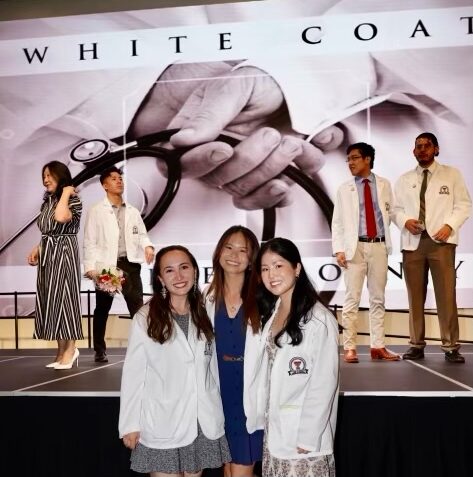
While challenging, Gaby adjusted quickly to life as a medical school student. She loves being in El Paso.
“I chose that medical school because it reminded me of a bigger version of my hometown,” Gaby said. “I also love the opportunities students have there to work at free health clinics and help with migrant care.”
Gaby has already made a difference for many patients by providing culturally competent care, a passion of hers.
“One time when I volunteered at a free clinic, I was able to talk to patients in Spanish from some of the words I learned in my Spanish classes at school,” Gaby said. “Moments like that get me excited because I realize I can really help people.”
Language barriers are just one challenge facing Latinos in accessing healthcare – differences in culture can be a barrier, too.
“I could connect with patients just by being Latina,” Gaby said. “Providers can learn to be more culturally competent, but I think it just helps to have that Latino representation in medicine.”
Gaby is right.
Although Latinos make up more than 19% of the total US population, they account for just 6% of US physicians.
Studies show that a more diverse healthcare workforce leads to better health outcomes among patients in many areas, including cancer treatment and maternal and infant health.
Therefore, having more people like Gaby in healthcare who can provide culturally competent care could help address health disparities in Latinos and other marginalized groups.
For example, “Some patients would talk about eating specific Latino foods and the provider was unsure of what they were talking about,” Gaby said. “So, when I would meet with the patients, I’d talk with them about changes to their diet that were culturally appropriate. For instance, someone really loved flour tortillas. I asked if they’d consider corn tortillas instead.”
Coming Back to the IHPR
After completing year one of medical school, Gaby returned to the IHPR as an intern in summer 2023 to “keep doing the work that I care about, even if it’s just for a little bit.”
Gaby’s continued contributions to the Avanzando Caminos study has fueled an interest in oncology.
“So, I think for this next year at school, I definitely want to shadow oncologists and explore that field more,” Gaby said.
Another area that interests Gaby is dermatology, especially in patients of color. Gaby hopes that maybe one day she can help address health disparities in this field as well.
“When I worked in the dermatology clinic, I noticed that the medical text unfortunately tends to show skin conditions on lighter skin,” Gaby explained. “This can lead to patients of color getting misdiagnosed or diagnosed later because different skin conditions, including skin cancer, can look different on darker skin.”
Timing is Everything
No matter what path Gaby chooses in medicine, she’s sure to have a positive impact.
The IHPR and her patients at the volunteer clinic are lucky to have her.
“Going to medical school felt like a dream that was finally starting to come true – I know that sounds cheesy, but for a long time I wasn’t sure about medical school. I had a lot of self-doubt,” Gaby explained.
But now, the timing is right, and Gaby confidently looks forward to year two as a medical student, and a future of providing care to Latinos and all people.
Explore More:
Latino CancerBy The Numbers
142
Percent
Expected rise in Latino cancer cases in coming years
This success story was produced by Salud America! with support from the Robert Wood Johnson Foundation.
The stories are intended for educational and informative purposes. References to specific policymakers, individuals, schools, policies, or companies have been included solely to advance these purposes and do not constitute an endorsement, sponsorship, or recommendation. Stories are based on and told by real community members and are the opinions and views of the individuals whose stories are told. Organization and activities described were not supported by Salud America! or the Robert Wood Johnson Foundation and do not necessarily represent the views of Salud America! or the Robert Wood Johnson Foundation.



